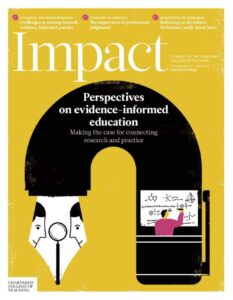Leading a research-informed approach to improving outcomes for summer-born children: A case study across a federation of three small infant schools in Southern England

This paper explores how a Federation of three small infant schools attempted to become self-improving through becoming evidence informed, and in collaboration with University College London and the local Teaching Alliance to reduce the attainment gap for summer born children during their first year in school. Adopting the model of a Research Learning Community (RLC) the Executive Head was been keen for all three schools to become research engaged and to move school professional development in the Federation away from traditional CPD models and towards one in which all teachers are engaged in research-informed enquiry. Small scale case study research led to schools evaluating the quality of the education they offer, understanding what they need to do to improve, taking appropriate action and evaluating the impact of their actions to enable them to achieve together to improve pupil outcomes. Drawing on data from three Reception classes (82 children) during the first year of the project (2015-16) there was a 26% increase in the number of summer born children achieving their ELG for writing.
In recent years, schools in England have experienced a number of reforms (changes to the English National Curriculum, changes to academy status, changes to budget funding) and they have had to react with haste to many externally-imposed dictates (Greany, 2015). A reduction in local authority support, due in part to budget cuts and a growing number of schools operating outside LEA control, has led many schools to look for alternative systems and new models for school improvement. The government white paper: ‘The Importance of Teaching’ (Department for EducationThe ministerial department responsible for children’s serv, 2010) set out guidelines for schools to raise standards through school-to-school support. The self-improving school system (Hargreaves, 2010), teaching school alliances, academy trusts and, more recently, the development of research learning communities (RLCs) as models for school improvement have led more schools to seek out networks with others in order to manage change and raise pupil attainment.
As a class teacher I became involved as a research lead in a two-year project, starting in 2015, in partnership with Excellence, Transformation, Collaboration (ETC) Alliance. The ETC teaching school alliance is made up of 31 schools, of all phases, situated in the south of Hampshire. The work of the alliance is coordinated by the director, with the executive head teacher of my school as a member of the strategic board. In early 2015, ETC began to develop its approach to engaging in research and using research-informed practice. The Oaks Learning Federation expressed an interest in becoming involved, regarding it as an opportunity to develop its schools into self-improving ones; so the RLC model was proposed and agreed upon. ETC’s director also canvassed schools within the alliance to encourage their participation and to ascertain which areas they would welcome focus on. In total, eight schools expressed an interest in participating – four primary schools and four secondary schools. These schools also expressed an interest in two focus areas: growth mindsets and assessment for learningKnown as AfL for short, and also known as formative assessme (AfLAssessment for Learning (also known as formative assessment)). Correspondingly, two RLCs were established (comprising two groups of four schools) with each specialising in one of the focus areas.
Working with the ETC Alliance and supported by Dr Chris Brown from University College London (UCL), the executive head teacher designated a member of the leadership team and a senior teacher the role of ‘research lead’ (Bennett, 2016) to join the AfL RLC to undertake a cycle of enquiry across the Federation. This enquiry focused on how to reduce the gap in attainment of summer-born children in writing. An analysis of The Oaks Learning Federation’s data showed that, typically, summer-born children were not attaining the end-of-year expectation for writing in Year R, compared with their older peers. In 2014 60% met this target (compared with 67% in Hampshire and 83% of their older peers in the Federation). According to the Institute for Fiscal Studies (2013), ‘These differences arise purely as a result of the organisation of the educational system; there is nothing fundamentally different about August-born children.’
Adopting both transformative and learning-centred leadership strategies (Brown, 2015), the executive head teacher and senior leaders modelled, monitored and provided the resources and structures required to maintain the project and to enable the research lead to develop a small-scale research learning community (Brown, 2016). Research learning communities build on both networked learning communities (NLCs) and professional learning communities (PLCs), synthesising the best from both. They promote the use of external knowledge and practitioner knowledge, with both of equal value in the process. Teachers learn from and build upon existing academic knowledge to develop new and effective teaching strategies to improve pupil outcomes (Brown, 2016). As a reflective practitioner, whose fundamental reason for joining the teaching profession was to improve children’s learning and achievement, it is natural that I use research to inform, develop, endorse and promote my practice.
Promoting the principles of RLCs, and in keeping with the factors identified by Brown and Zhang (2016) of teachers using research-informed enquiry to trial and evaluate the impact of new classroom approaches, a cycle of enquiry began in September 2015. The use of case study methods was chosen as the way to best address the contextual nature of RLCs and how teachers interact and transferThe processes of applying learning to new situations knowledge back to their schools and classrooms. Tight (2017) suggests that a case study in its most basic form is ‘small scale research with meaning’. Starting with the end point in mind – simply improving the number of summer-born children achieving their early learning goal (ELG) in writing at the end of their Reception year – we made a number of positive changes to our teaching practice. Developing research-informed teaching strategies, we began with the adoption of different pedagogical models for the youngest children across the three schools, for example, providing a variety of meaningful writing opportunities linked to the children’s interests for them to develop and practise writing during child-initiated learning. These activities were supported by the skills taught during adult-directed sessions, for example, a series of family workshops (where parents/family members came in for six one-hour weekly sessions to work alongside their child and teacher and learn how they could best support their child at home). Further professional knowledge was gained through joint practice development (JPD) visits to other schools, regular learning conversations with colleagues, and seminars with Dr Brown. In addition, our case study research was linked to our performance management targets, and changes were made to PPA organisation so that time could be allocated to JPD activities and research readings. This culminated in an increase in summer-born children achieving end-of-year expectations in 2015; the figure rose to 86% across the Federation, compared with 60% in 2014. The project is continuing in 2016-17, looking at the impact of pupil/staff interactions as a way of sustaining and maintaining improvement in pupil attainment and the development of professional trust amongst all members of the school community.
Yet to be effective, RLCs need to do more than simply create connections. As Earl (cited in Brown et al., 2015) suggests: ‘Research and evidence do not answer questions. Meaning comes through the human act of interpretation.’ Teachers need to engage and reflect upon research for it to make an impact in the classroom and therefore on pupil outcomes. As Wiliam (2010) contends, ‘Changes in what teachers know or believe will not benefit students unless teachers also change what they do in classrooms.’ Just as we, as class teachers, urge our children to achieve ever more, then we too have the responsibility to develop and challenge our own knowledge to this end. Using evidence to inform practice, in my experience, is a way of achieving this.
References
Bennett T (2016) The School Research Lead. Reading: Education Development Trust.
Brown C (2015) Introduction. In: Brown C (ed) Leading the Use of Research and Evidence in Schools. London: IOE Press, pp. 1-10.
Brown C (2016) Changing practice: The power of research learning communities. Professional Development Today 18 (4): 56-66.
Brown C and Zheng D (2016) How can school leaders establish evidence-informed schools: an analysis of the effectiveness of potential school policy levers. Educational Management Administration and Leadership, early online access.
Crawford C, Dearden L, Greaves E (2013) When you are Born Matters: Evidence for England. IFS Report R80. London: Institute for Fiscal Studies.
Department for Education (2010) The Importance of Teaching: The Schools White Paper 2010. London: The Stationery Office.
Earl L (2015) Reflections on the challenges of leading research and evidence use in schools. In Brown C (ed) Leading the Use of Research and Evidence in Schools. London: IOE Press, pp.146-152.
Greany T (2015) How can evidence inform teaching and decision making across 21,000 autonomous schools?: Learning from the journey in England. In Brown C (ed) Leading the Use of Research and Evidence in Schools. London: IOE Press, pp.11-29.
Hargreaves D (2010) Creating a self-improving school system. National College for Leadership Schools and Children’s Services. Available at: http://dera.ioe.ac.uk/2093/1/download%3Fid%3D133672%26fi lename%3Dcreating-a-self-improvingschool-system.pdf (accessed 5 March 2017).
Tight M (2017) Understanding Case Study Research: Small-Scale Research with Meaning. London: SAGE Publishing.
Wiliam D (2010) Teacher quality: Why it matters, and how to get more of it. Spectator Schools Revolution Conference. Available at: http://www.dylanwiliam.org/Dylan_Wiliams_website/Papers.html (accessed 5 March 2017).











